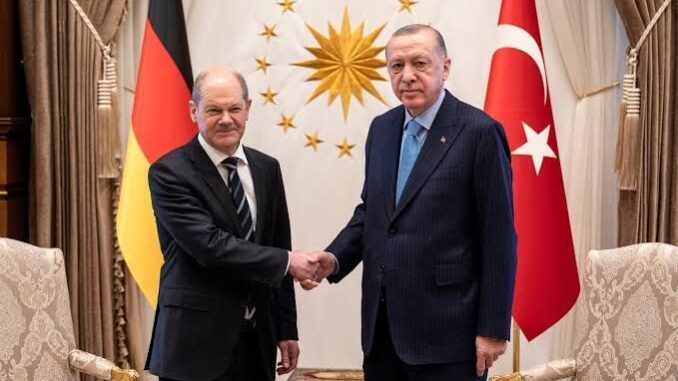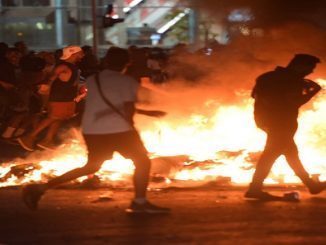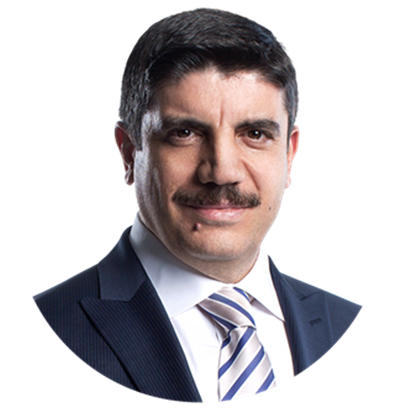
Turkish President Recep Tayyip Erdogan has paid a brief visit to Germany amid deep differences between the two NATO allies over the war in Gaza.
Erdogan has called Israel a “terror state” and pointed to its Western allies, including Germany, for supporting the military’s “massacres” in Gaza.
However, German Chancellor Olaf Scholz underlined Israel’s right to defend itself, without referring to the massacrs Israel is committing in Gaza. “Our solidarity with Israel is not up for discussion,” he said at a joint news conference with Erdogan.
However, Erdogan said, “We don’t owe anything to Israel, so we can speak freely”, referring to Germany’s responsibilities in the Holocaust and how Berlin can influence its relationship with Israel.
“If we were in debt, we could not talk so freely. But those who are in debt cannot talk freely,” he said.
The Turkish leader also lashed out at Israel over its relentless air and ground offensive in Gaza, saying that attacks on children and hospitals had no place in the Jewish holy book.
“Shooting hospitals or killing children does not exist in the Torah, you can’t do it,” Erdogan told reporters.
Ismail Thawabta, the director general of the government media office in Gaza, told reporters on Friday that the total number of Palestinians killed since the war broke out on October 7 has exceeded 12,000, including 5,000 children.
This was Erdogan’s first visit to Germany since 2020, when he attended a conference on Libya in Berlin.
Before the visit, the Turkish leader stepped up his condemnation of the Israeli assault on the besieged Gaza Strip, saying it had “unlimited support” from the West.
He had previously called for Israeli leaders to be tried for war crimes at the International Court of Justice in The Hague and repeated his view – and Turkey’s longstanding position – that Hamas is not a “terrorist organization” but a political party that won the last Palestinian legislative elections held in 2006.
This month, Germany announced a complete ban of Hamas activities, as well as those of the German branch of Samidoun, known as the Palestinian Prisoner Solidarity Network, claiming it “supports and glorifies” groups including Hamas.
“In our country, anti-Semitism is not permitted in any way,” said Scholz at the news conference.
“I would like to emphasise there are five million Muslims living in Germany and they have a place here,” he added.
“For us, there should be no discrimination between Jews, Christians and Muslims in the region. I have fought against anti-Semitism. I am a leader who is leading this fight,” Erdogan said.
German authorities have prohibited many pro-Palestinian demonstrations in what they said are efforts to prevent public anti-Semitism and curb disorder.
Germany is home to the largest Turkish diaspora abroad. A majority of the Turkish community of three million are supporters of Erdogan.
Erdogan’s stance sparked questions in Germany about the wisdom of hosting the Turkish leader at this time, with the opposition conservatives and even the liberal Free Democratic Party (FDP), a member of Scholz’s coalition, urging the chancellor to scrap the invitation.
While much of the news conference was dominated by the Israel-Hamas conflict, the two leaders also spoke about the Russia-Ukraine grain deal, which Turkey helped broker before Russia withdrew from it.
Turkish President Recep Tayyip Erdogan also met with his German counterpart Frank-Walter Steinmeier in Berlin on Friday, where they discussed Israel’s attacks on Gaza as well as relations between Ankara and Berlin.
Meeting at the Bellevue Palace, Steinmeier’s official residence, Erdogan said, “Israel’s attacks on Palestinian lands must cease and the global response to (Israel’s) human rights violations is essential,” according to a statement by Türkiye’s Communications Directorate.
“A cease-fire should be established immediately in the region, humanitarian aid should be delivered, as humanity loses every day that the bloodshed continues,” added Erdogan, who is paying a one-day working visit to Berlin.
“In addition to collaborating to ensure a cease-fire in the region and the prompt delivery of humanitarian aid, the two leaders agreed that the two-state structure is the only solution for permanent peace,” the statement stressed.
The meeting was also attended by Turkish Foreign Minister Hakan Fidan, Trade Minister Omer Bolat, Communications Director Fahrettin Altun, and other top Turkish officials.
It comes at a crucial time for the Israel-Palestine conflict, as Erdogan and protesters worldwide voice growing anger and frustration at the lack of a stronger response to what they call humanitarian violations and even war crimes by Israel.
As Israel has raided hospitals in recent days and shows no signs of letting up its attacks, any chance of reaching a cease-fire will require stronger pressure and a more unified international response.



